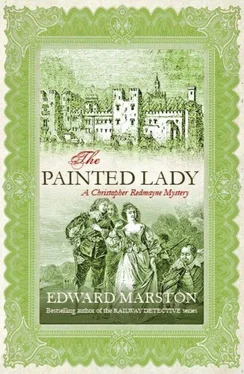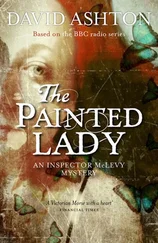Edward Marston - The Painted Lady
Здесь есть возможность читать онлайн «Edward Marston - The Painted Lady» весь текст электронной книги совершенно бесплатно (целиком полную версию без сокращений). В некоторых случаях можно слушать аудио, скачать через торрент в формате fb2 и присутствует краткое содержание. Год выпуска: 2011, ISBN: 2011, Издательство: Allison & Busby, Жанр: Исторический детектив, на английском языке. Описание произведения, (предисловие) а так же отзывы посетителей доступны на портале библиотеки ЛибКат.
- Название:The Painted Lady
- Автор:
- Издательство:Allison & Busby
- Жанр:
- Год:2011
- ISBN:9780749010324
- Рейтинг книги:3 / 5. Голосов: 1
-
Избранное:Добавить в избранное
- Отзывы:
-
Ваша оценка:
- 60
- 1
- 2
- 3
- 4
- 5
The Painted Lady: краткое содержание, описание и аннотация
Предлагаем к чтению аннотацию, описание, краткое содержание или предисловие (зависит от того, что написал сам автор книги «The Painted Lady»). Если вы не нашли необходимую информацию о книге — напишите в комментариях, мы постараемся отыскать её.
The Painted Lady — читать онлайн бесплатно полную книгу (весь текст) целиком
Ниже представлен текст книги, разбитый по страницам. Система сохранения места последней прочитанной страницы, позволяет с удобством читать онлайн бесплатно книгу «The Painted Lady», без необходимости каждый раз заново искать на чём Вы остановились. Поставьте закладку, и сможете в любой момент перейти на страницу, на которой закончили чтение.
Интервал:
Закладка:
‘Two horns on the head of Sir Martin Culthorpe.’
‘With the man who puts them there taking the prize.’
‘I like the idea,’ said Prout with enthusiasm.
‘I love it,’ said Sir Willard. ‘What about you, Jocelyn?’
All three of them turned to Jocelyn Kidbrooke, still seated and still deep in thought. Eyes blazing, he gnashed his teeth audibly.
‘Did you hear my suggestion?’ prompted Henry. ‘The chase is still on and the winner takes all. What’s your view of Culthorpe?’
Kidbrooke looked up. ‘Something must be done about him.’
‘That’s why the Society must have a new objective.’
‘There can be only one objective with regard to Sir Martin Culthorpe,’ said Kidbrooke with quiet intensity. ‘Araminta is in need of salvation. We must get rid of her husband.’
‘How soon will you be ready to start?’ asked Sir Martin Culthorpe.
‘As soon as the lady is ready for me,’ said Villemot. ‘I hear so much about your wife’s beauty that I long to meet her.’
‘I want you to immortalise that beauty on canvas, Monsieur.’
‘Then you come to the right man.’
Jean-Paul Villemot struck a pose, chin held up and arms spread out with a dancer’s grace. He was a swarthy man in his late thirties with a neat black moustache and beard giving definition to a gaunt face. His command of English was good but it was filtered through a strong French accent. Like Van Dyke and Lely, he was a portrait painter who had built up such a reputation in England that he was constantly in demand there. They were in his studio, a large, low-ceilinged, untidy room filled with half-finished paintings, discarded sketches and the pungent smell of artist’s materials. A black cat nestled in a chair. An easel stood near the window to catch the light.
‘Araminta will come here tomorrow,’ said Sir Martin.
‘How long have you been married?’
‘Three weeks.’
‘Three weeks?’ echoed Villemot. ‘And you are ready to let a young wife out of your sight? I see you are no Frenchman.’
Sir Martin straightened his back. ‘I’m a true-born Englishman,’ he attested, ‘and proud to be so. That means I have the most profound respect for the fairer sex.’
‘So do I, mon ami . I love, honour and respect the ladies.’
The Frenchman’s raised eyebrow went unseen by his visitor. Sir Martin Culthorpe was clearly not a man for innuendo and he was patently lacking any sense of humour. His face was pleasantly ugly, his expression one of beetle-browed seriousness. Now in his forties, he was upright, well-built and of medium height. While the artist wore colourful attire in the French fashion, his client chose only the most sober garments. Sir Martin was a rich landowner, known for his piety and his charitable inclinations. During the rebuilding of London in the wake of the Great Fire, more than one church rising from the ashes was doing so with the help of Sir Martin Culthorpe, who saw it as his Christian duty to restore the spiritual fabric of the capital.
‘Now,’ said Villemot, rubbing his hands together, ‘we come to the very important point.’
‘Have no fears on that score, Monsieur. I’m a wealthy man. I know that you are expensive but I want only the best. I have heard your terms and accept them willingly.’
‘I do not talk of money, Sir Martin.’
‘Oh?’
‘I talk only of clothing. I think, maybe, that you would prefer that your wife, she is painted in a dress.’
‘Of course,’ said Sir Martin, stiffly. ‘Isn’t that always the case?’
‘No, no,’ replied the artist with a broad smile. ‘Some husbands, they like to see their wives or lovers deshabille . Look, I show you.’ Moving to his easel, he drew back the cloth that covered the portrait on which he was working. ‘ Voila !’
Sir Martin gasped in horror. Pretending to be a Greek goddess was the nude figure of a gorgeous young woman, carrying a quiver of arrows that hid nothing of her ample curves. What stunned him was that Sir Martin believed he recognised the face as belonging to Lady Hester Lingoe and he recalled, with dismay, that she had always shown a keen interest in the Classical world. It had never occurred to him that she might take it to such lengths. Ashamed of what he had just seen, he turned away in disgust. Jean-Paul Villemot quickly drew the cloth over the painting.
‘It is not to your taste, I think,’ he remarked.
‘It most certainly is not,’ said Sir Martin, righteously. ‘I came in search of a portrait — not of an obscenity like that.’
The Frenchman shrugged. ‘What I am asked, I paint.’
‘Then I’ll ask for something very different, Monsieur.’
‘We come back to the lady’s wardrobe, then.’
‘My wife has already chosen what to wear.’
‘But she may not have chosen well,’ said Villemot, wagging a finger. ‘Lady Culthorpe only sees what is in the looking-glass. Jean-Paul Villemot, he has the eyes of the artist.’
‘What do you mean?’
‘I will pick out the colour to enhance your wife’s beauty and the fashion to display her at her best. Let her bring three or four dresses and try them on for me.’
‘That’s far too unseemly,’ protested Sir Martin. ‘My wife is no doll to be dressed and undressed at another man’s pleasure. If you must give advice about what Araminta should wear, you will have to visit our home and explore her wardrobe.’
‘ Tres bien ! I will come this very afternoon.’
‘We’ll be ready for you, Monsieur.’
‘And the portrait, it is of your wife only?’
‘Who else?’
‘Many husbands, they like to celebrate their marriage with a painting of themselves and their bride. This is not for you?’
‘No,’ said Sir Martin, firmly. ‘My face does not belong inside a gilt frame. It’s too unsightly. I would only spoil the picture.’
‘As you wish.’
‘That brings us to the question of your fee, Monsieur Villemot. I know that you do not ask for money until the portrait is finished but I insist on paying in advance.’
‘Thank you,’ said the artist, taking the fee from him, ‘though it was not necessary. I never want the money before I start. The only thing I want from my clients is that they keep to one simple rule.’
‘Rule?’
‘When someone sits for me, he or she must be alone.’
‘But I was hoping to accompany my wife.’
‘Then you need to find another artist to paint her portrait,’ said Villemot, folding his arms with a flash of temperament. ‘While I work, I do not allow anyone to look over the shoulder. It holds me back. I must have — what do you call it? — the freedom of expression.’
‘Araminta is very shy,’ argued Sir Martin. ‘She needs me there. I swear that I’ll keep out of your way.’
‘You will keep out of my studio or I am not for you.’
‘This is an unfair condition to lay upon me.’
Villemot was adamant. ‘I do not break the rule for anyone.’
There was a silent battle of wills. As the client, Sir Martin had expected to be there during the early sittings but that was evidently not the case. He was worried. He did not relish the thought of leaving his young wife alone with the Frenchman. Glancing at the easel, he was reminded that Villemot had painted his last subject as a nude and that the lady in question had disported herself naked on the very couch on which Sir Martin was sitting. That made him very uneasy. Another fact had to be considered. Apart from his natural prejudice against foreigners, Sir Martin felt certain that Villemot would be a Roman Catholic and he feared that Araminta might somehow be tainted if the man had uncontrolled access to her.
He was in a quandary. Eager for his wife to be painted by the leading artist of the day, he yet wanted to supervise their contact. The problem was that, while he was ready to place complete trust in Villemot’s artistic abilities, he did not have equal confidence in his moral standards. In appearance and manner, he was altogether too effusive and unconstrained for Sir Martin’s liking. If he let his wife alone with the man, she would be subjected to his practised charm. The anxious husband searched for a compromise.
Читать дальшеИнтервал:
Закладка:
Похожие книги на «The Painted Lady»
Представляем Вашему вниманию похожие книги на «The Painted Lady» списком для выбора. Мы отобрали схожую по названию и смыслу литературу в надежде предоставить читателям больше вариантов отыскать новые, интересные, ещё непрочитанные произведения.
Обсуждение, отзывы о книге «The Painted Lady» и просто собственные мнения читателей. Оставьте ваши комментарии, напишите, что Вы думаете о произведении, его смысле или главных героях. Укажите что конкретно понравилось, а что нет, и почему Вы так считаете.












